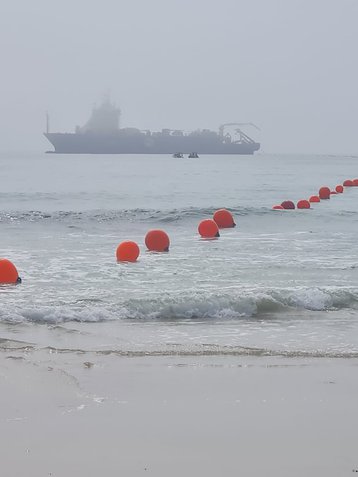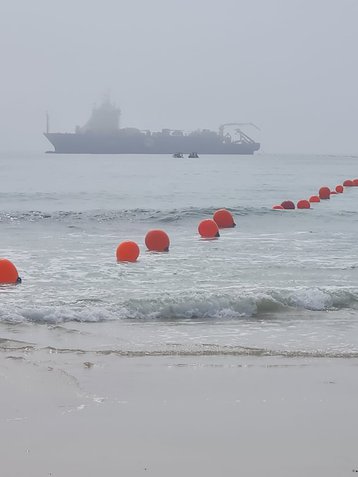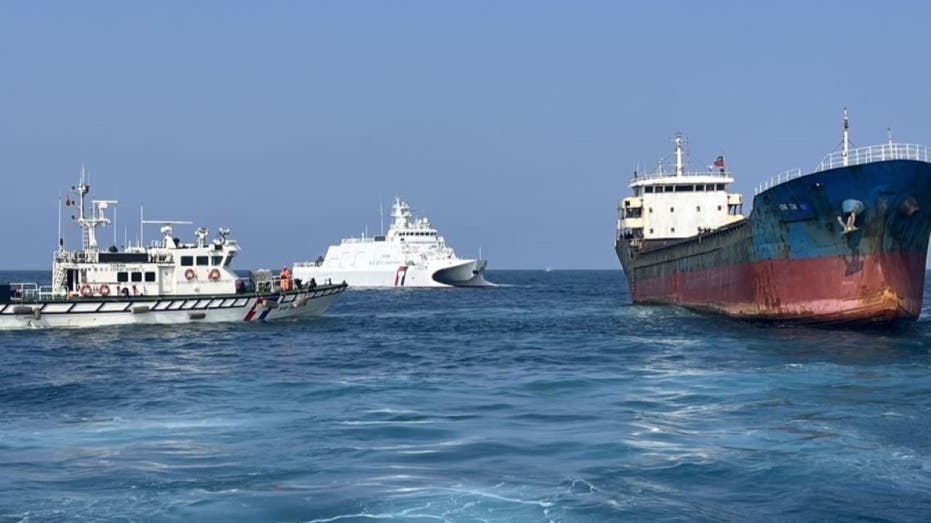
Chinese Crew Apprehended for Suspected Undersea Cable Tampering
Taiwan’s Coast Guard Administration (CGA) has taken significant action in response to a maritime incident involving a Togolese-flagged vessel suspected of damaging an undersea fiber optic cable crucial for communications between Taiwan and the Penghu Islands. This incident has raised alarms, shedding light on the ongoing tensions in the Taiwan Strait.
Details of the Incident
On Tuesday morning, February 22, the CGA received reports of the vessel Hong Tai 168 lingering suspiciously close to the undersea cable, approximately 925 meters away. The vessel was first detected around 7 p.m. the previous evening.
In a quick response, a coast guard ship was dispatched to the area at around 2:30 a.m. local time. The coast guard instructed the vessel to vacate the vicinity. However, by 3 a.m., officials confirmed the damaging news: the Taiwan-Penghu No. 3 undersea cable had been severed, leading to immediate actions to detain the crew members aboard the Hong Tai 168.
Implications for Communication Services
Following the severing of the cable, Taiwan’s Ministry of Digital Affairs acted swiftly to reassure the public and stakeholders, announcing that communication services were rerouted through alternate cables. This decisive action mitigated potential disruptions, ensuring that connectivity remained intact for residents and businesses reliant on these services.
China’s Gray Zone Activities
The CGA has classified this occurrence as a potential instance of “gray zone” activity, a term often associated with calculated yet non-conventional tactics that aim to exert pressure without stepping into open conflict. Taiwan’s government issued a commitment to investigate the incident further, aiming to ascertain the motivations and implications behind such maneuvers.
Rising Tensions in U.S.-China Relations
The timing of this maritime incident coincides with heightened tensions between Washington and Beijing. Just a week prior, the Chinese government expressed its discontent regarding changes made by the Trump administration to the U.S. State Department’s official communications concerning Taiwan. Specifically, language that previously denounced any support for Taiwan’s independence was removed.
Historically, the U.S. government’s fact sheet on U.S.-Taiwan relations included a clear statement: “We do not support Taiwan independence.” With the recent deletion of this phrase earlier this month, concerns have surfaced regarding its implications. Chinese officials reacted strongly, calling for the U.S. to “immediately correct its wrongdoing” and suggesting that this change sends a dangerous signal to proponents of Taiwanese self-determination.
U.S. Position on Taiwan: A Balancing Act
Despite the outcry from Beijing, officials from the U.S. State Department reaffirmed to NBC News that the country’s stance on Taiwan’s sovereignty has not fundamentally shifted. The U.S. has maintained a careful approach regarding Taiwan for decades, adhering to the “One China” policy, which recognizes Beijing as the legitimate government of China while choosing to remain ambiguous about Taiwan’s status.
This policy results in a delicate balancing act. The U.S. does not have formal diplomatic relations with Taiwan nor an official embassy on the island. However, it has consistently provided military aid and worked alongside allied nations to fortify Taiwan’s defense capabilities against potential Chinese aggression.
China’s Military Posturing
Chinese President Xi Jinping has repeatedly asserted that the option of military force remains on the table for bringing Taiwan under Beijing’s control. This belligerent rhetoric underscores the gravity of the situation, further complicating the already strained cross-strait relations.
Taiwan’s Quest for Recognition
In contrast, Taiwan, governed by its democratically elected leadership, continues to assert its identity as an independent nation. Since 1949, following the end of the Chinese civil war, Taiwan has operated with its own government and political systems, standing as a bastion of democracy in the region.
As tensions continue to mount, the events surrounding the Hong Tai 168 incident highlight the precarious situation in the region, where maritime security, national sovereignty, and international relations intersect in an increasingly complex geopolitical landscape.
Conclusion
The apprehension of the Chinese crew of the Hong Tai 168 raises critical questions about maritime security and potential state-sponsored activities in the Taiwan Strait. As Taiwan seeks to uphold its sovereignty and maintain stability, the ongoing scrutiny of U.S.-China relations further complicates the island’s position on the global stage. Stakeholders across the spectrum will be closely monitoring developments, as the actions taken in the coming days and weeks could have far-reaching implications for peace and security in the region.


















